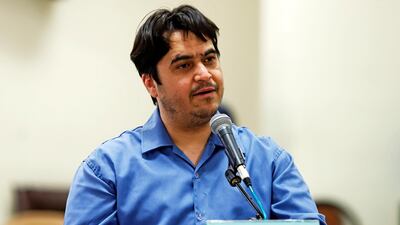Iran sentenced to death a journalist whose online work helped to inspire nationwide economic protests in 2017.
Ruhollah Zam ran a channel on messaging app Telegram that spread the times of the protests, which began after a sudden increase in food prices.
Embarrassing videos and information about Iranian officials were also posted on his website, AmadNews.
Iran's judiciary spokesman Gholamhossein Esmaili announced the sentence on Tuesday, saying Zam was convicted of “corruption on Earth".
That charge is often used in cases involving espionage or attempts to overthrow Iran’s government.
Zam was living in exile in Paris and was arrested after returning to Iran.
He appeared in a series of televised confessions in recent months.

The 2017 protests, which set the stage for mass unrest in November last year, led to criticism of Iran's supreme leader Ayatollah Ali Khamenei and President Hassan Rouhani, which could be heard in videos shared by Zam.
Telegram shut his channel down after the Iranian government claimed it spread information about how to make petrol bombs, but the channel continued under a different name.
Zam, who said he fled Iran after being falsely accused of working with foreign intelligence services, denied inciting violence at the time.
At least 25 people were killed during the demonstrations and about 5,000 were detained.
Zam is the son of Shiite cleric Mohammad Ali Zam, a reformist who served in a government policy position in the early 1980s.
The cleric wrote a letter published by Iranian media in July 2017 in which he said he wouldn’t support his son over AmadNews’ reporting and messages on Telegram.
Meanwhile, Mr Esmaili said an appeals court upheld a prison sentence for Fariba Adelkhah a prominent researcher with dual French-Iranian citizenship.
Mr Esmaili said she got two separate sentences, a five and a one-year prison terms on security charges and that under Iranian law, the longer sentence is the one served.
He said her time spent in jail will count towards the sentence.
Last July, Iranian officials said Ms Adelkhah was arrested on espionage charges. Those charges were dropped but security-related charges remained against her.
Ms Adelkhah and her French fellow researcher, Roland Marchal, were held in Iran’s Evin Prison. Authorities released Mr Marchal in March in an apparent prisoner swap for Iranian Jalal Ruhollahnejad, who was held in France.
Iran, which does not recognise dual nationality for its citizens, has a track record of detaining dual nationals or those with ties to the West.

